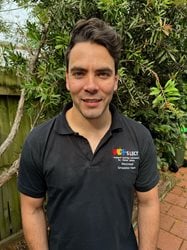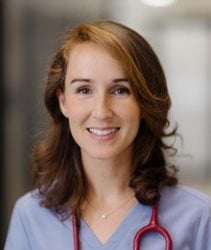The Buchanan Prize is awarded to the highest scoring candidates in a cohort of the clinical OSCE on their first attempt of the examination.
207 trainees sat the 2023.2 examination across three cohorts at the AMC’s National Test Centre in Melbourne.



Dr David Emmerig Dr Nicole Maitin-Casalis Dr Hector Thomson
Hector and David were both at work when they found out they had been awarded the prize. Hector received the email when he was grabbing a coffee with a few of the consultants who had helped him prepare for the OSCE’s.
He said, “Within about 30 seconds it had gotten on to all of our WhatsApp’s, so that was quite funny.”
The first person David told was his wife. He said, “We’ve got two very small children, so the main thing for us was that I passed the exam.”
Nicole was shocked when she found out the news. ““When I first saw the email from ACEM I thought: ‘Oh no, I hope they haven’t taken back my pass!’”
All three award winners stressed the importance of having study buddies, or a group, to practice with.
Hector studied with two close friends. “We met every day, for at least an hour,” he said, “and went through stations. Then we had lots of consultants at my hospital who were willing to do stations with us, which was really good.”
He also received a lot of support from his partner, Amy-May, who was encouraging and understanding throughout the process.
Nicole had one main study partner, Steph, who she worked with closely leading up to the exam. For her, finding someone similar to you, who you can study with, is vital when preparing for the OSCEs.
She said, “You can keep each other up during the downs, and push each other along to keep the momentum up.”
Nicole also found that reframing the exam process as something that shouldn’t necessarily reflect real life was helpful.
“I found that challenging in that I don’t think it’s necessarily representative of you as a doctor,” she said. “You just have to learn to come round to the idea that it’s a bit of a show, a performance on the day.”
One thing that Hector learned is to not be too formulaic in your answers.
“We started off trying to find the perfect answer to every question and then we soon realised that listening really closely to what the people in the station were saying was more important,” he said.
“Actively listening during the stations, which can be really hard under pressure, was the best tip we got.”
For David, the key to studying effectively, especially when you have young children, is to be flexible with when and how you study.
“You just have to take your opportunity to study when you can, while accepting that you do have a family, and have all those other responsibilities.”
He credits his wife, Hannah, as one of the main reasons he got through the exams.
He said, “It was difficult. It was a lot of studying at night, and there was a lot of my wife looking after the kids when I went off and studied, but having gotten through now, it’s a lot nicer for us as a family.”
In terms of next steps, Hector plans to work in retrieval for six months before landing a consultant job.
Nicole is enjoying her time working at Tweed Hospital. “It’s a really nice hospital, one of the smaller ones. It’s really supportive and communal.”
David hopes to use his experience with the OSCEs to help the next generation of emergency trainees. “I’m going to stay at Westmead Hospital. Then, hopefully, I can use the lessons that I’ve had preparing for this exam to give back and contribute to the trainees coming through there.”
The Buchanan Prize was established in 1986 and is named after ACEM Foundation Fellow Dr Peter Buchanan. It consists of a bronze medal and a certificate and is awarded at the annual College Ceremony.